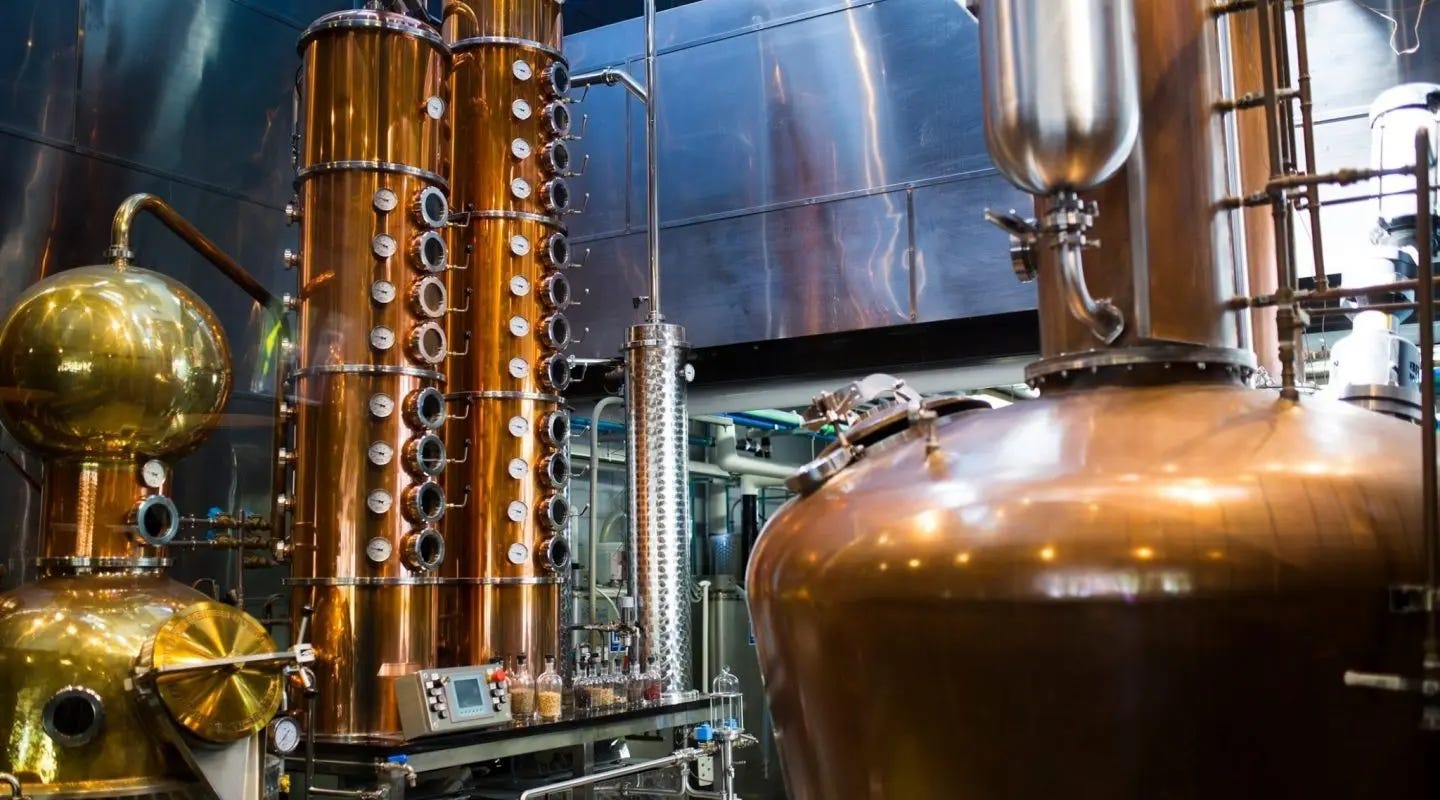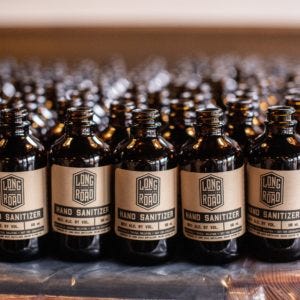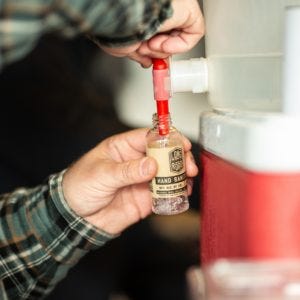How Craft Beer and Spirits Turned Into Hand Sanitizer During a Pandemic
A first-person account from a small distillery
By Isaac LaGrand
Many have observed that federal regulations have stymied the quick production of hand sanitizer during the coronavirus pandemic. For my family, these barriers are more than abstractions. As co-owners of the Long Road Distillers, a craft spirits maker, they know well the legal impediments to shifting to production of this needed compound.
Like many of us, I’ve traveled back to my family home in Grand Rapids, MI to ride out this crisis, and I have been able to observe firsthand the bumpy regulatory road for a distiller to become a hand sanitizer producer.
First, a bit about the company. Long Road Distillers makes artisan gins, vodkas, and whiskeys and, in usual times, it operates a full bar and restaurant. In March it had to furlough its entire front-of-house staff as restaurants across the state closed down. But the company found a way to keep busy and help fight COVID-19 at the same time, and Long Road’s production crew is busier than ever. Over the past seven weeks, making hand sanitizer has become its primary business.
As everyone knows, the demand for hand sanitizer has far outstripped the supply. In early March, sanitizer began disappearing entirely from store shelves. To help fill this need, the World Health Organization published a simple recipe for making hand sanitizer. Distillers quickly realized that they were well-positioned to help as high-proof ethanol, the lifeblood of spirits, is hand sanitizer’s main ingredient.
There are many hurdles in creating a new supply chain during a pandemic. For Long Road the first hurdles were regulatory. In mid-March, Long Road managers called the Food and Drug Administration (FDA) to ask what it would take to get approval to produce hand sanitizer. They learned it would be a complicated, multiple-step process. In fact, under the existing rules it seemed that it would take too long to be worth it.
However, two weeks later the FDA streamlined the process to make it easy to register online as a producer. Almost as important, in the same two weeks the Alcohol and Tobacco Tax and Trade Bureau, the branch of the US Treasury that collects taxes on alcohol products, waived its alcohol excise tax for hand sanitizer, meaning that distilleries would not have to denature the sanitizer with toxic material to keep it from being taxed as a beverage.
Given their prior experience with rigid regulatory structures, the Long Road managers were surprised at this new federal flexibility. They never expected that the rules would be changed within a month. They credit the American Craft Spirits Association (an industry group that Long Road belongs to) for quickly identifying the biggest barriers to conversion and lobbying to remove them.
Supply chain problems have been an impediment as well. Putting together all the inputs to make hand sanitizer has not been easy. During normal times, Long Road mostly distills a stock of high proof “neutral spirits” (which are 95 percent pure ethanol) to make into final products such as gin and vodka. These neutral spirits are also the basic ingredient of liquid hand sanitizers. Given the extreme demand for hand sanitizers, Long Road quickly used up its entire stock of this critical component.
Distilling neutral spirits from grain is a slow process that takes over a week. Since it was unclear how long the demand for their sanitizer would last, Long Road first looked to speed up production by buying more neutral spirits from large commercial beverage distilleries. But the company found that most large distillers were not taking on new customers because they too were facing a run on their product.
Interestingly, while the demand for consumption-grade ethanol has spiked, the demand for fuel ethanol has collapsed as oil prices have crashed. Ethanol behaves similarly to gasoline and can be used as a fuel for vehicles and industrial equipment. Ethanol distilled for fuel is not made safe for human consumption, so it often still contains methanol and acetaldehyde, toxic byproducts that are removed when distilling beverage ethanol. More importantly, fuel ethanol is often denatured with gasoline so that it isn’t subject to alcohol excise taxes.
After trying to order ethanol from beverage suppliers, Long Road received several unsolicited offers of cheap fuel ethanol from industrial suppliers because of the glut of fuel-grade ethanol. The managers turned them down for a number of reasons. Mostly, they were not confident that they could identify and remove gasoline if they received a batch that contained it. While a small amount of gasoline in hand sanitizer would probably not be dangerous, the regulatory and liability risk was too high.
Luckily, Long Road has been able to secure an input that is less refined than pure ethanol: craft beer. Most craft breweries sell the majority of their beer in their in-house taprooms or to bars. Michigan bars and taprooms are all closed by executive order, so local craft breweries have been left with large stockpiles of beer that they need to get rid of. Since the first step in distilling spirits is to brew a beer-like “mash,” distilleries can simply substitute craft beer for the mashed and fermented base. In the last six weeks, Long Road has taken deliveries of 30,000 gallons of beer from craft breweries and distilled it into neutral spirits for hand sanitizer.
Packaging the hand sanitizer has been another challenge. Most distilleries are making a sprayable liquid hand sanitizer rather than the gel most people are used to. To package it, Long Road needed to find small plastic spray bottles. Here, too, the spike in demand has not yet been met with higher supply. Long Road’s usual bottle distributor could not find any appropriate plastic bottles. The managers were able to buy a small number on Amazon, but those ran out quickly. Eventually, after trawling through several pages of Google searches, they discovered the eBay account of a small medical supplier in Tennessee. They called the company and bought the entire stock.
Because it is hard to know how long the hand sanitizer trade will last for distillers, our family business is avoiding high fixed cost investments. Long Road’s normal bottling systems don’t work for the small hand sanitizer bottles, so our distillers are filling each bottle by hand. Rather than bulk ordering labels from our usual printers, the managers are using label sheets they can make on their office printer.
The demand for the sanitizer seems to be holding steady. Most orders have been from hospitals, assisted living facilities, and first responders, but grocery stores have also been placing orders for resale. Small producers like Long Road are just waiting for the big companies to step up their production.
We will probably soon be back in the world of abundant hand sanitizer, but for now there are still shortages to be fought. As Long Road’s experience shows, when the government frees small businesses to innovate and solve hard problems, they find a way.




